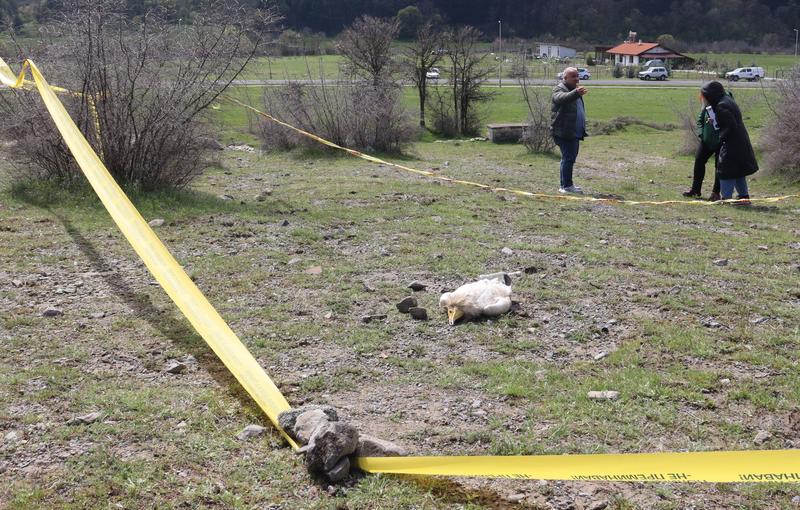An investigation is underway into a new case of a poisoned protected species – two Egyptian vultures in the Eastern Rhodopes region
10 Apr, 2025 | 13:49On April 8, 2025, during the regular monitoring of the Egyptian vulture species in the Eastern Rhodopes region, which the Bulgarian Society for the Protection of Birds (BSPB) conducts, an ornithologist from the association visited the area where one of the pairs of the species nests near Momchilgrad.
Initially, the pair was observed flying over the nest, after which the birds descended and landed in a nearby pasture. After a few minutes, the female bird (marked with a GPS transmitter) began to feed on a piece of meat. While she was being observed and photographed, the first symptoms of poisoning were noticed - the bird began to extend its neck, sat back slightly and foam began to drip from its mouth. The BSPB expert reached the bird and tried to provide it with emergency assistance, but the female Egyptian vulture died within minutes in his hands. The male specimen flew away, and the ornithologist was unable to witness whether he had also fed on the poisoned bait. This tool place within 10-15 minutes, which demonstrates the extraordinary speed with which poisoned baits work.
The non-governmental organization immediately took the necessary actions according to the action plan for such situations (according to the National Action Plan for Combating the Illegal Use of Poisons in Wildlife 2021 - 2030, approved by Order No. RD-795/02.08.2021 of the Minister of Environment and Water, Appendix No. 8.3. Protocol for Action in the Event of Illegal Use of Poisons) - a signal was submitted to the Single European Emergency Number 112 and the "Crimes against the Environment and Wildlife" sector of the General Directorate of the National Police (GDNP) at the Ministry of Interior was notified.
The BSPB poison control team, consisting of two ornithologists and two trained dogs for searching and finding poisoned baits and poisoned animals in nature (Bars and Buda), also arrived at the site. After a thorough search of the area, the second vulture was found, which had fallen 50-60 m into the bushes, poisoned, but still showing signs of life. The area was searched with the dogs for additional poisoned baits in order to prevent further damage. A veterinarian from Momchilgrad provided first aid to the still-alive Egyptian vulture, and an injection of atropine, which acts as an antidote, was also administered. The specimen was transported to the Wildlife Rescue Center - Green Balkans, in Stara Zagora, where it is currently undergoing active treatment for survival and recovery. At the same time, the team managed to find all the poisoned baits.
All actions have been taken to assist the investigation. The veterinary medical examination was appointed by investigating police officers from the Momchilgrad Regional State Police, and the samples were taken on site by a team of veterinarians from the Thracian University. The ecologists of the Momchilgrad Municipality, which took responsibility for cleaning the area, also assisted in the case.
This is yet another serious incident of poisoning of protected species. The Egyptian vulture (Neophron percnopterus Linnaeus), also called the small vulture, the white-faced vulture, the falcon, is a species of the Accipitridae family. In Bulgaria, it is a protected species under the Biodiversity Act. The provisions of the Criminal Code apply to the destruction of the species. The species is also included in the country's Red Book.
One of the main negative factors affecting the species is the use of poisons in agriculture, as well as illegal poisoned baits for large predators. The Ministry of Environment and Water supports the suggested amendments to the Criminal Code in connection with recent cases of cruelty to animals. These amendments will allow for an increase in the maximum effective penalties and the use of special investigative means, which are permissible only in a limited range of cases, including in the investigation of serious intentional crimes, taking into account the difficulties in establishing and investigating crimes involving the use of poisons in nature.
Long-term efforts and financial resources have been invested in the conservation of the Egyptian vulture in Bulgaria. In the past, the species was distributed throughout the country, gradually decreasing or disappearing from its traditional regions (the Sinite Kamani Nature Reserve, the Strandzha region, the area between the Studen Kladenets and Ivaylovgrad dams, the Vratsa mountain region, the Ruse Polomie - Lomovete). As of 2005, the total number of these birds in Bulgaria was 60–75 pairs. Currently, there are 36 occupied territories of the species in the country (2 of single birds and 34 of pairs, i.e. 70 adult specimens). Over the past 20 years, the Egyptian vulture species has been actively worked on - mainly through the implementation of LIFE project activities by non-governmental organizations, ensuring the isolation of risky power lines, feeding (a large percentage of pairs are fed through feeding sites, which does not prevent the possibility of specimens taking poisonous baits outside the feeding sites), nest protection, a breeding program, and the release of birds imported from zoos in Europe. By 2024, a total of 40 specimens were released into the wild, six of which were released in 2024 alone.
